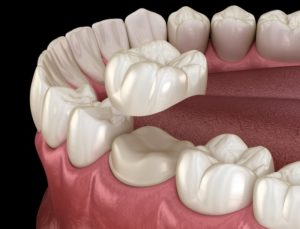
Have you been struggling recently with a cracked or broken tooth? You are probably looking forward to that dental visit to get some relief from the discomfort. They recommended you get a dental crown, but you are wondering if the procedure will hurt. Your dentist in Englewood going to ensure you are comfortable during the procedure, but it may take a few days afterward for your mouth to feel normal. Keep reading to learn what to expect and get some tips on managing discomfort and temporary crown care.
Expect Your Mouth to Be Numb
Before preparing your tooth for a crown, your dentist will likely administer a local anesthetic to the tissue near the tooth. It will keep that area of your mouth numb during the procedure. The numbness may linger for a few more hours, so it’s best to avoid eating until it has worn off. Otherwise, you risk biting your tongue or the inside of your cheek without even realizing it.
You’ll Get Back to Normal in a Few Days
Once the numbness subsides, your newly crowned tooth will probably feel sore. Additionally, you might feel pain where the anesthetic was injected. To minimize discomfort, it’s a good idea to take over-the-counter pain medication such as ibuprofen or acetaminophen before the numbness completely dissipates.
Another way to reduce pain is to rinse your mouth with a salt water solution 2-3 times a day. Not only does this soothe the irritated soft tissues in your mouth, but it also kills bacteria to decrease the risk of infection.
For the next few days, your crowned tooth might feel sensitive to hot and cold temperatures. During this period, avoid coffee, ice cream, and other foods or beverages with extreme temperatures that may aggravate sensitivity.
Take Care of Your Temporary Dental Crown
You’ll wear a temporary crown for a few weeks until the permanent one arrives at your dentist’s office from a dental lab. Since temporaries are weaker and not as firmly bonded to your tooth as permanent crowns, you must take special care of them.
Stay away from foods that are particularly sticky or hard to prevent your crown from becoming dislodged or fractured, respectively. Better yet, try to avoid chewing directly with that tooth altogether. Be consistent with your oral hygiene routine but when flossing next to the crowned tooth, slide the floss out of the space between the teeth rather than lifting it.
As long as you follow your dentist’s directions, dental crown recovery should go smoothly. Of course, call them if you experience discomfort or pain that worsens instead of subsiding, or if your crown comes off. With their expertise and guidance, you’ll soon have a permanent crown to protect your tooth for years to come!
About the Author
Dr. James Boeller earned his dental doctorate from the University of Florida and has utilized continuing education to study specialties like periodontics, endodontics, oral surgery, TMD treatment, orthodontics, and sedation dentistry. He is a member of the American Dental Association. If you are interested in a dental crown, Dr. Boeller and his fellow dentists can offer you one to protect your tooth for 15-plus years and financing options are available. Schedule an appointment on their website or call (941) 474-6466.
